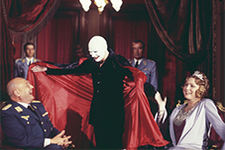Mephisto
|  István Szabó’s Mephisto is a haunting study in ambition, opportunism, and compromise. The story takes place in Germany during the rise of the Third Reich and uses its protagonist, a provincial actor from Hamburg named Hendrik Höfgen (Klaus Maria Brandauer), to dramatize how a man who lacks true conviction and morality is particularly dangerous during times of tumult because his willingness to go with those in power reinforces their dangerous ideology and gives it the appearance of legitimacy. Authoritarian regimes like the Nazis do not come into power by sheer brute force (although that is an important component), but by using hegemonic manipulation to convince a significant swath of the population to go along with their horrors. Hendrik is not a particularly sympathetic or likeable character, but he is immediately recognizable as human and therefore understandable. We would all like to think that we wouldn’t be like him, but the truth is that too many of us would be, which explains why despots from Benito Mussolini to Donald Trump are able to not only amass power, but sustain it with support from the very populace they are exploiting. In the first of their three collaborations, Szabó and Péter Dobai adapted the screenplay from the infamous 1936 novel by German-born writer Klaus Mann, who was, at the time of the novel’s writing, in exile from Germany and living in Amsterdam (he later emigrated to the U.S., where he became a citizen). Mann’s novel was a thinly disguised portrait of Gustaf Gründgens, his one-time brother-in-law, a famous stage and film actor in Germany who remains a figure of intense dispute regarding his collaboration with the Nazis. Mann had left Germany in 1933 after he was prosecuted by the Nazis for a political cabaret he created called Die Pfeffermühle, but he stayed in contact with numerous artists who remained there despite Hitler’s rise to power. Thus, Mephisto’s plot and themes reflect Mann’s direct experiences, although it also functions as a broad parable about corruptibility that aligns neatly with Hendrik’s favorite role of Mephistopheles in Faust, a role with which he becomes so associated that people call him Mephisto. Hendrik is a man who puts on political ideologies like that season’s fashion—whatever fits and works best for him at the time is what he wears. When we first meet him as an actor in Hamburg, he is caught up in the fury and passion of Russian-inspired revolutionary theatre. He waxes poetic about the hardships of the proletariat and the need to make the theatre experience a revolutionary one that consumes both the actors and the spectators. His girlfriend, Juliette (Karin Boyd), is black, which suggests that he has progressive views on race, although it is also evident that he is willing to engage in relationships that benefit him politically or financially, which is why he marries his wife, Nicoletta (Ildikó Bánsági), whose father is well-connected. As the Nazis come to power, Hendrik finds himself being drawn into their program of remaking German culture and eradicating anything they view as degenerate. He is celebrated as an actor in Faust, but he is moved into positions of increasing power, first as a director and then as the head of the Prussian State Theatre. He is particularly drawn to Tábornagy (Rolf Hoppe), a German officer in the mold of Hermann Göring, who uses Hendrik to help legitimize the Nazi’s remaking of German culture in their own image. Of course, Hendrik doesn’t really believe in the Third Reich, but he is all too willing to enjoy the prominence and social perks his association with them gives, as well as power and control over his art. As he tells numerous characters who question his willingness to work with the Nazis, he considers himself an artist first and foremost and his actions are solely in defense of the theatre. But, as one character tells him, they are hollow words. They are the words of a man who must reach to defend the indefensible, and much of the film’s power derives from the deeply discomfiting truth it reveals about the seduction of power and how words can be used to justify almost anything. With its meticulous production design by the legendary and prolific József Romvári, Mephisto dramatizes with startling clarity how well the Nazis understood the power of pomp and circumstance, of pageantry and performance. This necessarily entails leaving out the true horrors of National Socialism (no concentration camps here), but that is precisely the experience someone like Hendrik would have had—comfortable and secluded from the true atrocities his self-justified actions are making possible. The allure and seductiveness blind him to the horror just behind the very curtain he is helping to draw. Although he becomes famous for playing Mephistopheles, he is clearly Faust, drawn astray from righteous pursuits by the allure of power and prestige. Brandauer, who at the time was known primarily for his work onstage and in German television, gives a striking performance that is alive with the tension between Hendrik’s actions and his justifications. Brandauer is greatly physical in the role, and his Hendrik is a live wire, always seeking attention and gratification and acclaim, but with a tragically, pathetically stunted sense of self-awareness. One of the film’s greatest scenes finds him coming to Tábornagy for a favor that he clearly expects to be rewarded, only to be shouted down and humiliated, something he has not experienced in so long that he literally doesn’t know how to respond. In that moment we sense a dawning awareness of the circumstances in which has put himself, but of course, by that point, it is too late. István Szabó had been directing films since the mid-1960s, and most of them dramatized the history of his native Hungary. Mephisto marked a major turning point for him, as the film took home the Best Screenplay award at the Cannes Film Festival and won the Oscar for Best Foreign Language Film, the first time a Hungarian film had received that honor (Mephisto subsequently became a staple of video rental stores’ foreign film sections in the 1980s). And, while the film dramatizes the past and is firmly located in the history of Germany, it is instructive for our current age, which has seen a marked rise in despotic behavior aided and abetted by those who should know better. Nations may rise and fall, but the allure of power and its attendant corruptions are eternal.
Copyright © 2020 James Kendrick Thoughts? E-mail James Kendrick All images copyright © Kino Lorber | |||||||||||||||||||||||||||||
Overall Rating: 


 (4)
(4)


